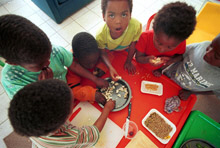
Typical street scene in Santa Ana, El Salvador. (Photo: iStock)
IMF Survey: Financial Crisis Threatens Effort to Cut Poverty
April 24, 2009
- Global financial crisis setting back progress on poverty reduction
- Growth in developing countries hit by global recession
- Strong policy actions needed to respond to development emergency
The global financial crisis has hit poor countries especially hard, posing serious threats to their hard-won gains in boosting economic growth and achieving progress toward the UN Millennium Development Goals (MDGs), a joint IMF-World Bank report warns.

The latest IMF-World Bank report warns that most human development goals are unlikely to be met at the global level (photo: Newscom)
Global Monitoring Report
The overall outlook for the MDGs (a set of eight globally agreed development targets that the international community is aiming to achieve by 2015), already a cause for serious concern, has become still more worrisome, says this year’s Global Monitoring Report 2009: A Development Emergency (GMR). Strong economic growth in developing countries in the past decade had put the MDG for poverty reduction within reach at the global level, but the triple punch of the food, fuel, and financial crises creates new risks.
According to the report, the goals of gender equality in primary and secondary education and access to clean water have seen relatively good progress and are expected to be achieved at the global level. However, most human development goals—especially for child and maternal mortality, but also for primary school completion, nutrition, and sanitation—are unlikely to be met at the global level.
“With simultaneous recessions striking all major regions, the likelihood of painfully slow recoveries in many countries is very real, making the fight against poverty more challenging and more urgent,” said John Lipsky, IMF First Deputy Managing Director, in a statement.
Impact on developing countries
The GMR says that the global financial crisis will affect developing countries through reductions in export volumes, commodity prices, remittances, tourism, foreign direct investment, and possibly even foreign aid. The IMF said April 22 that growth in developing countries is projected to fall to 1.6 percent in 2009, from an average of 8.1 percent in 2006–07. The global economy is projected to shrink by 1.3 percent in 2009, with a slow recovery expected to take hold next year.
At their summit in London on April 2, the G-20 leaders, which represent both advanced and developing economies, decided to dramatically beef up the IMF’s lending capacity to support its ability to combat financial contagion, providing significant new financing and a broad mandate for action.
The huge increase in IMF resources would bolster the IMF’s firepower to help economies around the world respond to the crisis, which has plunged economies into recession and sent world trade plummeting. Low-income countries would also get help, with leaders proposing more than a doubling of concessional lending resources.
Getting back on track
To overcome the global financial crisis, the first order of business is stabilizing financial markets in developed countries and countering the recessions that the financial turmoil has triggered. At the same time, strong and urgent actions are needed to help poor countries restore strong growth and recover lost ground in their progress toward the MDGs. The GMR proposes several priorities for action.
• Ensuring an adequate monetary and fiscal response. However, most developing countries faced with sharply declining growth and consequent major social disruptions lack the resources to mount any fiscal response. Additional financing would therefore help them support growth and protect the poor and vulnerable from the impact of the crisis.
• Restoring the health of the global financial system. Forceful and urgent action is needed to cleanse balance sheets and recapitalize banks, and improve coordination among the affected economies. Although advanced economies are most hit by the financial crisis, the need to address bank liquidity and solvency problems is also pressing in many developing countries. Also, advanced and developing countries should strengthen financial regulation and bank supervision.
• Supporting the private sector. A vibrant private sector is central to growth and job creation. Fiscal stimulus will catalyze sustainable economic growth only if there is a vigorous private sector response. Access to finance and infrastructure and the quality of business regulation are three key determinants to spur private investment.
• Redoubling efforts toward human development goals. Progress toward the human development goals must be accelerated. More attention needs to be paid to strengthening key programs in health and education, such as control of major diseases including AIDS and malaria. The crisis also calls for better leveraging the role of the private sector (for-profit and non-profit) in human development.
• Delivering on aid. After rising moderately during 2003–05, official development assistance from the major industrial countries fell in 2006 and 2007. This trend must be reversed. Donors should scale up aid rapidly to deliver on their commitments. Indeed, the crisis calls for going beyond the aid commitments made at Gleneagles as the needs of the poor countries have increased sharply.
• Maintaining an open trade and finance system. It is vitally important to maintain trade openness and resist the recent rise in protectionist pressures, which would only deepen the slump in global trade and undercut prospects for economic recovery for all. In support of trade facilitation, aid for trade should be scaled up substantially. And the global community must achieve a quick and successful conclusion to the Doha round of trade negotiations.
• Empowering multilateral institutions. The international financial institutions have a crucial role to play in supporting an effective response to the global crisis and the development emergency that now confronts many poor countries. The IMF is reforming its lending programs and financing framework to ensure its assistance meets the diverse needs of its members. On April 23, the IMF agreed to double the borrowing limits of the poorest countries under its low-interest lending facilities to help low-income countries severely affected by the global economic downturn.
Comments on this article should be sent to imfsurvey@imf.org


